

Journals. Ebook. ECT. Withdrawing from Antidepressants Can be Dangerous. How Prozac works- brief animation. Depression - Treatment. Antidepressants are medicines that treat the symptoms of depression.
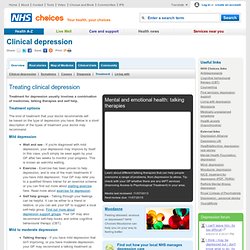
There are almost 30 different kinds available. Most people with moderate or severe depression benefit from antidepressants, but not everybody does. You may respond to one antidepressant, but not to another, and you may need to try two or more treatments before you find one that works for you. The different types of antidepressant work about as well as each other. However, side effects vary between different treatments and people. When you start taking antidepressants you should see your GP or specialist nurse every week or two for at least four weeks to see how well they are working. If you've had bouts of depression in the past, you may need to continue to take antidepressants for up to five years or longer. Antidepressants aren't addictive, but be prepared to get some withdrawal symptoms if you stop taking them suddenly or you miss a dose.
Selective serotonin reuptake inhibitors (SSRIs) 'Testosterone link' to depression. Older men with lower levels of the male sex hormone testosterone in their blood may be more prone to depression, a study suggests.

A study of about 4,000 men aged over 70 found those with lowest testosterone were three times more likely to be depressed than those with the most. Researchers suspect the hormone may affect levels of key brain chemicals. The study, by the University of Western Australia, features in Archives of General Psychiatry. Research has found that women are more likely to be depressed than men until the age of 65, when the difference between the genders almost disappears.
Electroconvulsive Therapy (ECT) Introduction This leaflet is for anyone who wants to know more about ECT (Electro-convulsive therapy). It looks at how ECT works, why it is used, its effects and side-effects, and alternative treatments. Although a safe and effective treatment, ECT remains controversial and we have included some of the different views about it. Psychoanalysis. By Saul McLeod published 2007, updated 2014 Psychoanalysis was founded by Sigmund Freud (1856-1939).
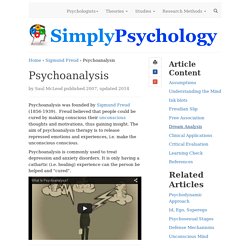
Freud believed that people could be cured by making conscious their unconscious thoughts and motivations, thus gaining insight. Electroconvulsive Therapy (ECT) Introduction This leaflet is for anyone who wants to know more about ECT (Electro-convulsive therapy).
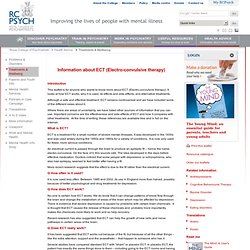
It looks at how ECT works, why it is used, its effects and side-effects, and alternative treatments. Although a safe and effective treatment, ECT remains controversial and we have included some of the different views about it. First UK study of ketamine for people with severe depression. Health | Science 03 Apr 14.

Depression eased quickly with experimental drug: Works in brain like Ketamine, with fewer side effects, study suggests. A drug that works through the same brain mechanism as the fast-acting antidepressant ketamine briefly improved treatment-resistant patients' depression symptoms in minutes, with minimal untoward side effects, in a clinical trial conducted by the National Institutes of Health.
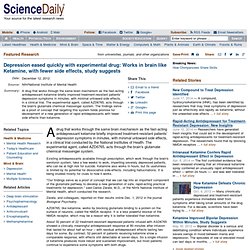
The experimental agent, called AZD6765, acts through the brain's glutamate chemical messenger system. Existing antidepressants available through prescription, which work through the brain's serotonin system, take a few weeks to work, imperiling severely depressed patients, who can be at high risk for suicide. Ketamine Reduces Suicidality In Depressed Patients, Study Suggests. Drug treatment options for depression can take weeks for the beneficial effects to emerge, which is clearly inadequate for those at immediate risk of suicide.
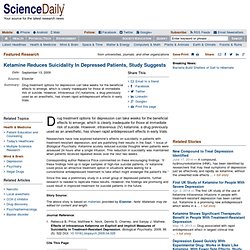
However, intravenous (IV) ketamine, a drug previously used as an anesthetic, has shown rapid antidepressant effects in early trials. Researchers have now explored ketamine’s effects on suicidality in patients with treatment-resistant depression, and are publishing their results in the Sept. 1 issue of Biological Psychiatry. Ketamine acutely reduced suicidal thoughts when patients were assessed 24 hours after a single infusion. First Top 10 List for Antidepressants. When someone swallows his or her first antidepressant, it may come as a surprise how the psychiatrist chose that particular pill to prescribe: It's a best guess out of dozens of antidepressants on the market.
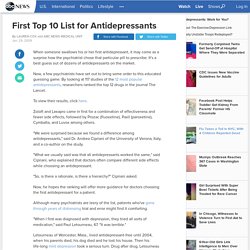
Now, a few psychiatrists have set out to bring some order to this educated guessing game. By looking at 117 studies of the 12 most popular antidepressants, researchers ranked the top 12 drugs in the journal The Lancet. To view their results, click here. Zoloft and Lexapro came in first for a combination of effectiveness and fewer side effects, followed by Prozac (fluoxetine), Paxil (paroxetine), Cymbalta, and Luvox among others. "We were surprised because we found a difference among antidepressants," said Dr. "What we usually said was that all antidepressants worked the same," said Cipriani, who explained that doctors often compare different side effects while choosing an antidepressant. Can Someone Please Come Up With a Way to Soothe Depression Faster? So let's say you're really depressed and haven't been able to pull yourself out of your misery.
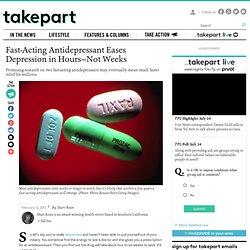
You somehow find the energy to see a doctor and she gives you a prescription for an antidepressant. Then you find out the drug will take about four to six weeks to work, if it works at all. Fast-acting antidepressant appears within reach. For someone with depression in the midst of a crisis, there is no time to waste.
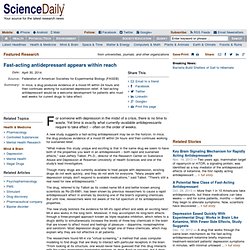
Yet time is exactly what currently-available antidepressants require to take effect -- often on the order of weeks. A new study suggests a fast-acting antidepressant may be on the horizon. In mice, the drug produces evidence of a mood lift within 24 hours and then continues working for sustained relief. "What makes this study unique and exciting is that in the same drug we seem to have both of the properties you want in an antidepressant -- both rapid and sustained effects," said Jeffery Talbot, Ph.D., director of the Research Center on Substance Abuse and Depression at Roseman University of Health Sciences and one of the study's lead investigators.
Antidepressants: Selecting one that's right for you. Antidepressants: Selecting one that's right for you Confused by the choice in antidepressants? With persistence, you and your doctor should find one that works so that you can enjoy life more fully again. By Mayo Clinic Staff. A new fast-acting antidepressant (that's not ketamine) shows promise - LA Times. Existing antidepressants, if they work at all, can take weeks to work, and for the deeply depressed, that can mean the difference between life and death. Researchers have discovered and tested an agent that, in mice at least, appears to reverse hopeless behavior quickly and continues to work for a sustained period. And it's not ketamine, the anesthesia medication-turned-party drug that has a shown promise as a fast-acting antidepressant hobbled by a host of practical drawbacks. The latest hope as a psychiatric rescue drug is called MI-4, and news of its promise was reported earlier this week at the San Diego meeting of the Federation of American Societies for Experimental Biology (FASEB).
Scientists also have identified the drug as Ro-25-6981. In the test tube, MI-4 was found to simultaneously increase the availability in the brain of three neurotransmitters that play a key role in depression: serotonin, dopamine and norepinephrine. The new antidepressant that could work in just DAYS. Research shows blocking a hormone receptor in brain induces fast-acting antidepressant effects in mice - it could lead to new drugs for humansSelectively blocking these serotonin receptors significantly reduced depression-like behaviour in mice in just five daysCurrently, only two drugs - ketamine and scopolamine - act rapidly. But due to severe side effects, neither is suitable for human use. Party Drug Ketamine Could Help Treat Severe Depression, Says Yet Another Study. The party drug ketamine could be the answer to treating even seemingly untreatable cases of depression, according to a growing body of research.
A new study published this week in the Journal of Psychopharmacology found that approximately one-third of patients with what researchers referred to as "treatment-resistant depression" experienced a significant mood improvement after being treated with up to six intravenous ketamine infusions over the course of several weeks. "Three days after the last infusion, the depression scores had halved in 29 percent of the patients," said a news release on the study, which was conducted by United Kingdom researchers at Oxford Health NHS Foundation Trust and the University of Oxford.
Why ketamine produces a fast antidepressant response. Depression: New Medications On The Horizon. Depression: New Medications On The Horizon. Depression Medications: Antidepressants. Depression Treatment. New Brain Stimulation Technique May Provide Rapid Depression Relief. By Rick Nauert PhD Senior News Editor Reviewed by John M. Grohol, Psy.D. on July 24, 2014 Brain stimulation treatments are often used to treat depression. However, protocols of electroconvulsive therapy (ECT) and transcranial magnetic stimulation (TMS), often have a delayed onset — similar to depressant medications.
21 Signs That Your Worries Are Out of Control. Bad things happen from time to time, do they not? Ketamine and depression - AccessScience from McGraw-Hill Education. Antidepressant effects of ketamine in depressed patients. To view the full text, please login as a subscribed user or purchase a subscription. Click here to view the full text on ScienceDirect. Synaptic Dysfunction in Depression: Potential Therapeutic Targets. Signaling pathways underlying the rapid antidepressant actions of ketamine.
Synaptic Mechanisms Underlying Rapid Antidepressant Action of Ketamine. Neuropsychological Research Laboratory Homepage - Neuropsychology Research Laboratory - USF Health - Tampa, Florida. The Neuropsychological Research Laboratory was established in conjunction with the USF Neuropsychology Division which evaluates the cognitive functioning of individuals with known or suspected neuropathology. In order to facilitate research aimed at understanding the relationships between cognition and various disease states (e.g., Alzheimer's disease, stroke, Parkinson's disease, epilepsy, traumatic brain injury, etc.), we have created databases to support such work.
Active datasets include: Ketamine for depression: where do we go from... [Biol Psychiatry. 2012] Selective serotonin reuptake inhibitors (SSRIs) Antidepressants. Media - Vol. 19, Part 6 ( June 2006) Something borrowed, something blue - Vol. 16, Part 12 ( December 2003) Depression: Treatment of Depression. Depression and How Psychotherapy and Other Treatments Can Help People Recover.
Understanding depression and effective treatment. Depression Treatment. Depression therapy on the NHS. Clinical depression - Treatment. What is depression? Symptoms of depression, help and treatment. Depression Treatment: Therapy, Medication, and Lifestyle Changes. Mind, the mental health charity - help for mental health problems.
Traditional treatment for depression is not always the answer.